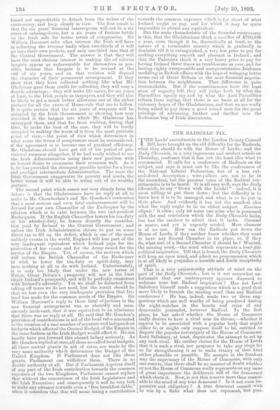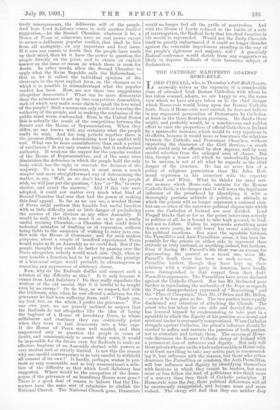THE RADICALS' FIX.
SHE Lords' amendments to the London County Council 1 Bill, have brought up the old difficulty for the Radicals, what they should do with the House of Lords ; and the Daily Chronicle, in a very ingenuous and modest article on Thursday, confesses that it has not the least idea what to recommend. It calls for a, conference of Radicals on the subject, and says it must not be like the conferences of the National Liberal Federation, but of a less cut- and-dried description ; wire-pullers are not to be in the ascendent, but the genuine voice of the Radical con- stituencies is to be heard. It is all very well, says the Daily Chronicle, to say " Down with the Lords I "—indeed, it is most willing to put them down ; but the difficulty is to know how it is to be managed, and what is to be put in their place. And evidently it has hot the smallest idea what the reply ought to be on either subject. Reoriare aliquis ! it cries ; only let some one arise who is possessed with the real conviction which the Daily Chronicle lacks, but has the candour to admit that it lacks. Counsel is scarce, and yet is urgently needed. Mere clamour is of no use. How can the Radicals put down the House of Lords, if they neither know whether they want to have any Second Chamber in its place, or, if they do, what sort of a Second Chamber it should be ? Wanted, the missing word,—the word which represents a bond-fide political inspiration. Till that is found, the Daily Chronicle will keep an open mind, and admit no prepossession which is at all likely to prejudice a humble and docile receptivity of spirit. That is a very praiseworthy attitude of mind on the part of the Daily Chronicle ; but is it not somewhat un- fortunate that our contemporary appears disposed to welcome none but Radical inspiration ? Has not Lord Salisbury himself made a suggestion which is a good deal more likely to furnish the missing word than any Radical conference ? He has, indeed, made two or three sug- gestions which are well worthy of being pondered during the night-watches in the hearts and reins of any democratic journalist, however Radical. In the first place, he has asked whether the House of Commons really desires to have a rival near its throne,—whether it aspires to be associated with a popular body that might either be, or might only suppose itself to be, entitled to dispute the popular sovereignty of the House of Commons. Lord Salisbury, at least, deprecates the attempt to set up any such rival. He neither claims for the House of Lords that it is such a rival, nor proposes to take any steps for so far strengthening it as to make rivalry of that kind either plausible or possible. He accepts in the frankest way the supremacy of the House of Commons, with only one reserve, that there shall be no manner of doubt whether or not the House of Commons really represents on any issue of great importance the deliberate will of the democracy which elects it. Now, is not this reserve more than reason- able to the mind of any true democrat ? Is it not even im- perative and obligatory ? A true democrat cannot wish to win by a fluke what does not represent, but posi- tively misrepresents, the deliberate will of the people. And here Lord Salisbury comes in with another fruitful suggestion, let the Second Chamber, whatever it be, a House of Peers or otherwise, have no real power except to secure a deliberate popular verdict, that shall be free from all ambiguity, on any important and final issue. If it sees any reason to doubt that the people have made up their mind, then let it have the power to question the people directly on the point, and to obtain an explicit answer on the issue or issues on which there is room for doubt. In other words, allow the Second Chamber to apply what the Swiss Republic calls the Referendum,— that is, let it collect the individual opinions of the electorate in the most explicit form, on the changes as to which it is possible to misunderstand what the popular verdict has been. Now, are not these two suggestions altogether democratic ? What can be more democratic than the reluctance to set up two competitive Assemblies, each of which may make some claim to speak the true mind of the people ? Such a course can only result in lowering the authority of the people, and in making the confusion of the public mind worse confounded. Even in the United States this is actually the result of the competition between the Senate and the House of Representatives. When they differ, no one knows with any certainty what the people really do wish. And for long periods together there is the greatest difficulty in determining how the conflict will end. What can be more unsatisfactory than such a period of vacillation ? It not only wastes time, but it undermines authority. It weakens the respect for the popular verdict of the House of Representatives, and at the same time diminishes the deference in which the people hold the only body which has the right to overrule the decision of the majority. To a true democrat, it must seem a much simpler and more straightforward way of determining the matter, to say, Well, as we don't know what the people wish, we will just put the question, "Aye " or "No," to every elector, and count the answers.' And if this rule were adopted, it could not matter very much what kind of Second Chamber that was that had the power of making this final appeal. So far as we can see, a weeded House of Peers could perform this humble but useful function with as little difficulty and as little danger of prejudicing the answer of the electors as any other Assembly. It would be well, we think, to weed it so as to get a really useful revising Chamber,—a Chamber that could detect technical mistakes of drafting or of expression, without being liable to the suspicion of wishing to enter into con- flict with the House of Commons ; and for such modest purposes, about a couple of hundred experienced Peers would make as fit an Assembly as we could find. But if the people thought they could do better by passing over the Peers altogether, nobody would much care. Only, when so very humble a function had to be performed, the prestige of a historical origin would probably be advantageous as removing any appearance of arbitrary choice.
Now, why do the Radicals dislike and suspect such a solution of the difficulty as this ? Is it only because it - comes from Lord Salisbury ? Do they really repudiate the wisdom of the old maxim that it is lawful to be taught even by an enemy ? Or do they, as we suspect, feel with the Irishman, who, when he was offered a solatium for the grievance he had been suffering from, said : "Thank you, my lord, but, on the whole, I prefer the grievance." For our own part, we are gravely inclined to suspect that the Radicals do not altogether like the idea of losing the bugbear of a House of hereditary Peers, to whose selfishness and obstinacy they can continually point when they want to lash democrats into a blue rage. If the House of Peers were well weeded, and then empowered only to question the people in cases of doubt, and conscientiously to count their votes, it would be impossible for the future even for Radicals to make an effective bugbear of an Assembly clothed with powers so very modest and so strictly limited. Is not this the reason why our candid contemporary is so very careful to withhold all counsel of its own P It hardly, perhaps, wishes to pro- mote so very reasonable and so very unsensational a solu- tion of the difficulty as that which Lord Salisbury has suggested. Where would be the occupation of the dema- gogue, if the grievance of an hereditary House were gone P There is a good deal of reason to believe that the Dis- senters have the same sort of reluctance to abolish the National Church. The National Church gone, Dissenters would no longer feel all the pride of martyrdom. And with the House of Lords reduced to the limits of a note of interrogation, the Radical feels that his chief function in life would be superseded. Would not the Daily Chronicle itself be greatly embarrassed if it could no longer thunder against the venerable impediment standing in the way of the people's righteous and majestic will ? A genuinely Radical conference would shrink from any suggestion so likely to deprive Radicals of their favourite subject of declamation.



































 Previous page
Previous page